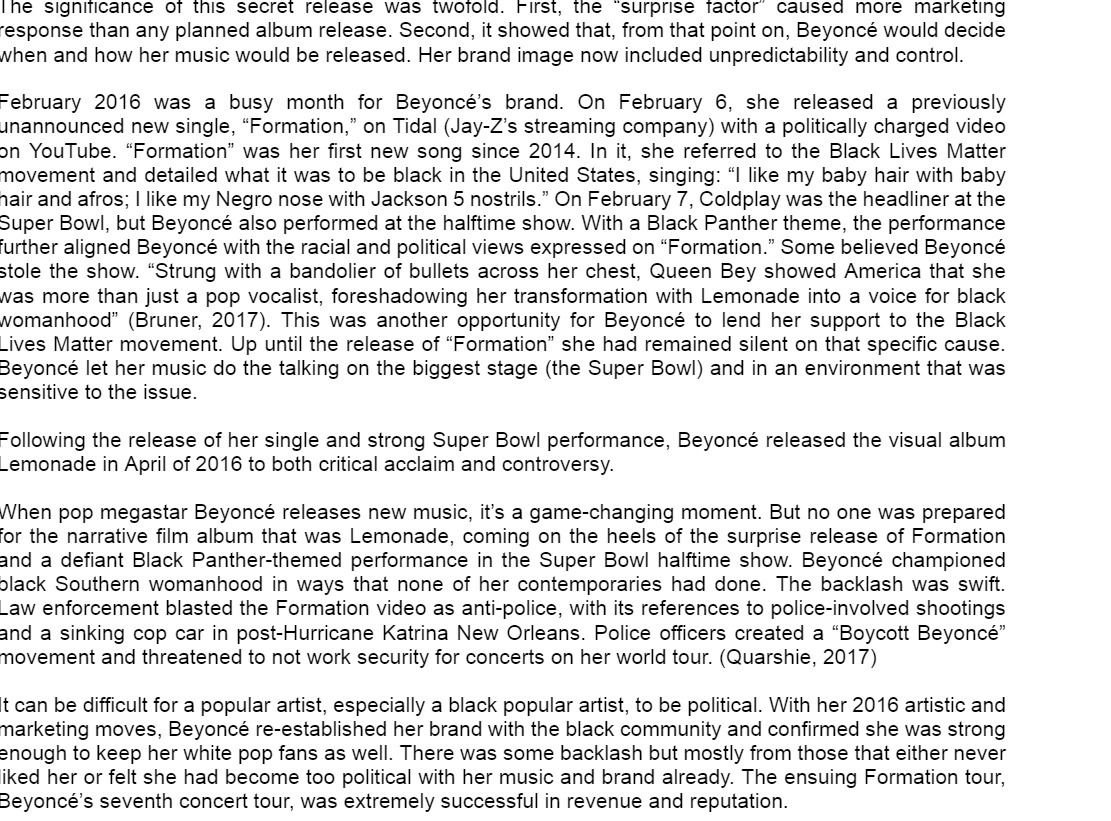I he significance of this secret release was twofold. l-lrst, the "surprise tactor' caused more marketing 'esponse than any planned album release. Second, it showed that, from that point on, Beyonc would decide when and how her music would be released. Her brand image now included unpredictability and control. February 2016 was a busy month for Beyonc's brand. On February 6, she released a previously .lnannounced new single, \"Formation,\" on Tidal (Jay-2's streaming company) with a politically charged video on YouTube. \"Formation\" was her rst new song since 2014. In it, she referred to the Black Lives Matter movement and detailed what it was to be black in the United States, singing: \"I like my baby hair with baby 1air and afros; I like my Negro nose with Jackson 5 nostrils.\" On February 7, Coldplay was the headliner at the Super Bowl, but Beyonc also performed at the halftime show. With a Black Panther theme, the performance further aligned Beyonc with the racial and political views expressed on \"Formation.\" Some believed Beyonc stole the show. \"Strung with a bandolier of bullets across her chest, Queen Bey showed America that she was more than just a pop vocalist, foreshadowing her transformation with Lemonade into a voice for black womanhood\" (Bruner, 2017). This was another opportunity for Beyonc to lend her support to the Black Lives Matter movement. Up until the release of \"Formation\" she had remained silent on that specic cause. Beyonc let her music do the talking on the biggest stage (the Super Bowl) and in an environment that was sensitive to the issue. Following the release of her single and strong Super Bowl performance, Beyonc released the visual album Lemonade in April of 2016 to both critical acclaim and controversy. When pop megastar Beyonc releases new music, it's a game-changing moment. But no one was prepared for the narrative lm album that was Lemonade, coming on the heels of the surprise release of Formation and a deant Black Panther-themed performance in the Super Bowl halftime show. Beyonc championed clack Southern womanhood in ways that none of her contemporaries had done. The backlash was swift. Law enforcement blasted the Formation video as anti-police, with its references to police-involved shootings and a sinking cop car in post-Hurricane Katrina New Orleans. Police ofcers created a \"Boycott Beyonc\" movement and threatened to not work security for concerts on her world tour. (Quarshie, 2017) It can be difficult for a popular artist, especially a black popular artist, to be political. With her 2016 artistic and marketing moves, Beyonc re-established her brand with the black community and confirmed she was strong enough to keep her white pop fans as well. There was some backlash but mostly from those that either never iked her or felt she had become too political with her music and brand already. The ensuing Formation tour, Beyonc's seventh concert tour, was extremely successful in revenue and reputation







